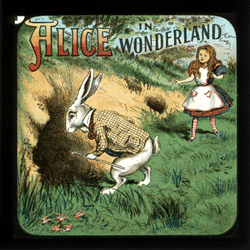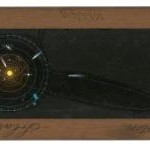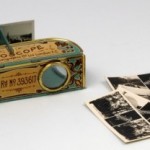
I recently blogged about the launch of the University of Exeter’s Digital Collections Online.
Some of the amazing images that were digitised and added to the repository demand to be highlighted in more depth.
With all the hype about Tim Burton’s new Alice in Wonderland film, it seems appropriate to highlight the amazing collection of images that the archive holds on film and cinema (and the optical and visual more generally).
The image of Alice included in this piece, is taken from a box of slides that come originate in a Magic Lantern Collection.
This pre-cinematic invention used a series of slides that were projected onto a wall. Smallscale shows were put on by travelling lanternists using a candle to project the images.
Occassionally visual tricks were employed to engage and capture the audiences attention – not dissimilar to  our ongoing fascination and the appeal of 3D at the movies!
our ongoing fascination and the appeal of 3D at the movies!
But, the link between the past and present is not the only value of digitising and making these collections available online.
The collection held by Exeter is fascinating, not only for what it can tell us about the history of cinema and film; but also how the edges of each object and collection of objects touch upon, and overlap with other areas of study and research.
Many of the slide collections are incredibly rich resources for researchers and students looking not only at, for example, cinematic history, but also the subject matter and content of the images and objects themselves.
Magic lantern slides cover subject areas including, astrology and zoology offering a rare and primary source glimpse into Victorian culture and ideas.
The project has attempted to provide preliminary pathways through some of the content by creating ‘curated’ collections and e-learning packages centred around certain themes.


It seems this collection cannot help but cross new boundaries and inspire new ideas and avenues of thought.
